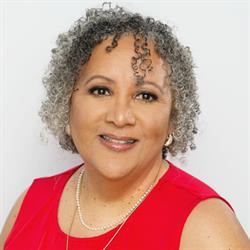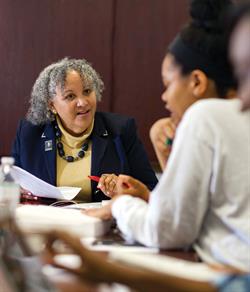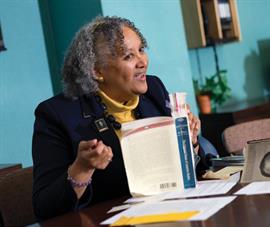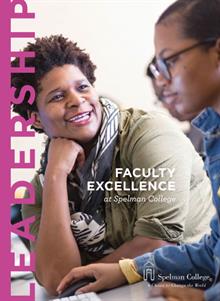 During her 32 years at Spelman, Donna Akiba Sullivan, Ph.D., has held broad and varied leadership roles as both an instructor and administrator. She served six years as chair of the English Department and three as president of Faculty Council. She is one of just three endowed chairs at the College, and served a two-year term as dean of Undergraduate Studies.
During her 32 years at Spelman, Donna Akiba Sullivan, Ph.D., has held broad and varied leadership roles as both an instructor and administrator. She served six years as chair of the English Department and three as president of Faculty Council. She is one of just three endowed chairs at the College, and served a two-year term as dean of Undergraduate Studies.Donna Akiba Sullivan Harper, Ph.D.: Leading Through a Passion for Students and Scholarship
 During her 32 years at Spelman, Donna Akiba Sullivan, Ph.D., has held broad and varied leadership roles as both an instructor and administrator. She served six years as chair of the English Department and three as president of Faculty Council. She is one of just three endowed chairs at the College, and served a two-year term as dean of Undergraduate Studies.
During her 32 years at Spelman, Donna Akiba Sullivan, Ph.D., has held broad and varied leadership roles as both an instructor and administrator. She served six years as chair of the English Department and three as president of Faculty Council. She is one of just three endowed chairs at the College, and served a two-year term as dean of Undergraduate Studies.
Students are Her Preeminent Concern
“I’m a teacher at heart,” said Dr. Harper. “Focusing on students is what I love.” That focus isn’t always directed through her classroom teaching. Dr. Harper often impacts her student’s academic experience through her forceful engagement with the administrative and managerial processes that influence everything from curricula development to department size and faculty governance.
“I think there are many faculty members who are shy about speaking,” she said. “I’m not one of them.”
As department chair, former dean and faculty leader, Dr. Harper, a Fuller E. Callaway Professor, has encouraged the College to direct its energies toward assuring that instructors have the many, and often highly-varied, tools they need to be effective.
“People think because it’s a college for Black women [everyone is the same], but that’s not the end of the story,” Dr. Harper said.
“Our faculty, in terms of ethnicity and gender and age are so much more diverse than our student body, so our faculty needs are very different. Being able to interact with colleagues and learn that we had one group of people who needed equipment and one group of people who were concerned about safety and one group of people who wanted space showed that our needs are really diverse."Dr. Harper said that diversity should also be reflected in how Spelman faculty and administrators evaluate the school’s programs relative to those of other institutions. For Spelman, such “benchmarking” can be tricky because as a small, historically Black, women’s college, it defies easy categorization. Still, Dr. Harper sees benchmarking as a vital step in assuring that the College remains competitive.
“Spelman has a challenging identity, but I think benchmarking can help us know who our peers are and who our peers are not,” said Dr. Harper.
“I think benchmarking tactics would be good, certainly for all chairpersons. The more colleagues who know it, the better the appeals will be, the more knowledgeable the appeals will be, and the more reasonable the requests will be when people understand more about what is being done at other institutions. And I think I learned a lot about that from my leadership roles at Spelman.”
Sacrificing for Scholarship
 Sixteen years before her arrival at the College, the future Dr. Akiba Harper was a high school senior tasked with one of her earliest leadership roles – serving as the first African American valedictorian at her school in southern Virginia.
Sixteen years before her arrival at the College, the future Dr. Akiba Harper was a high school senior tasked with one of her earliest leadership roles – serving as the first African American valedictorian at her school in southern Virginia. Dr. Harper had been among the first three African American children to desegregate the public schools in her hometown of Suffolk, so she had already spent more than her share of time as “the only Black student in the class.” She managed to excel in her studies and opted to attend Hampton University, one of the nation’s earliest HBCUs. At Hampton, she met Dr. Jessie Lemon Brown, a distinguished professor who helped broaden her literary perspective. During this time, Dr. Harper discovered the writer who would inspire her most profound and important scholarship: Langston Hughes.
Discovering the Brilliance of Langston Hughes
“He saw beauty in Black people and was saying that in 1926,” says Dr. Harper. “In 1971, we thought we were Black and proud and that we had invented that idea. Seeing that this man was writing those lines in 1926 -- I was so in love.” That love has been expressed and re-expressed in Dr. Harper’s award-winning excavations of the life and work of the poet who ignited the Harlem Renaissance and has influenced writers of every race, gender and ethnicity. Dr. Harper’s voluminous essays, scholarly papers, and compilations have established her as a leading authority on Hughes and earned her numerous recognitions including The Langston Hughes Prize for Excellence in Literature and Vision presented by the Langston Hughes Society, and Spelman’s own Presidential Faculty Award for Scholarly Achievement.
A founding member and past president of the Langston Hughes Society and a founder of the Langston Hughes Review, Dr. Harper is only the fourth person in Spelman history to be named Fuller E. Callaway Professor, an endowed chair awarded for meritorious scholarship.
Despite the praise and commendation for her work on Hughes, Dr. Harper says there have been times when the poet was out of vogue at Spelman.
It was a challenge when Spelman kind of went through a new stage and we were so woman centered and wanted faculty who teach about women. But I do Langston Hughes, so I had to keep pushing. I thought 'I'm not going to give up, you've got to have Langston Hughes.” -- Donna Akiba Sullivan Harper, Ph.D.
Her effort to keep Hughes high on the College’s reading list led Dr. Harper to a revelation: teach women about how Langston Hughes interacted with women.
“I found a way to grow the evidence of how he wrote about and interacted with women as part of a seminar focusing on Hughes as a writer as opposed to the works, per se,” said Dr. Harper. “So I am willing to change in whatever ways are necessary, but Langston is not going to leave my heart and my mind.”
Of course, retooling a college seminar isn’t always a passion project; usually, it’s just work. And Dr. Harper, who earned her master’s degree and Ph.D. at Emory University, has spent much of her long career engaged in the back-breaking, mind-bending labors associated with running a college department, managing the varietal demands of a busy faculty, and addressing the small but emotionally-taxing concerns of students in academic trouble.
Working Hard for the Good of Future Generations
 In fact, her tendency to work longer and harder than anyone else in the room once prompted a colleague to suggest that Dr. Harper is a “victim of her own competence.”
In fact, her tendency to work longer and harder than anyone else in the room once prompted a colleague to suggest that Dr. Harper is a “victim of her own competence.”
She laughed off the comment, blithely, ignoring the fact that her three-year term as president of Spelman’s Faculty Council was supposed to be for two years or that she allowed herself to be arm-twisted into the presidency of the College Language Association despite her efforts to recruit an alternate.
Dr. Harper said that although leadership makes myriad personal and professional demands, she still “encourages people to step up and be leaders.”
“Many times I hear people hesitate because they say, ‘I’m too busy,’ or ‘I’ve got to do my research,’ or ‘I’ve got a family,’ and all of these are real, but I assure you that the things I’ve done in my life, I’ve done while caring for elderly parents, taking care of a child, and being a significant other to a partner. People should find a way to juggle a little bit because leadership teaches you lessons you cannot learn any other way.”
 As we continue to elevate the Spelman difference, we lift up the accomplishments of our faculty in the many ways that they manifest excellence. In our Faculty Excellence at Spelman College publication, we highlighted innovations in research and creative endeavors. This issue uplifts various forms of faculty leadership in the College and beyond.
As we continue to elevate the Spelman difference, we lift up the accomplishments of our faculty in the many ways that they manifest excellence. In our Faculty Excellence at Spelman College publication, we highlighted innovations in research and creative endeavors. This issue uplifts various forms of faculty leadership in the College and beyond.
